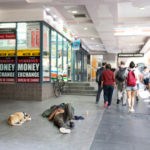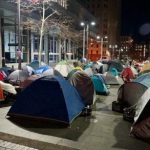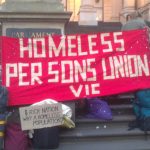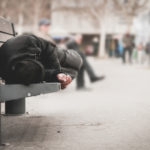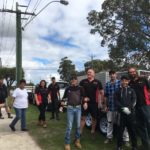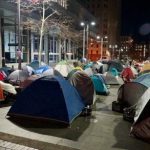“Bloody Reprehensible”: Gerry Georgatos on Perth Rough Sleepers During COVID-19
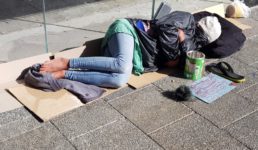
Right now, there’s around 1,000 rough sleepers in the wider Perth, Fremantle and Peel region. And despite the fact that the rest of the population is in lockdown, the majority of these homeless people are still out on the streets as the COVID-19 pandemic unfolds.
And rather than act to provide shelter with the aim of protecting them and the wider community during the health emergency, WA police is simply moving the rough sleepers on when they’re encountered.
Besides the fact that this form of policing is completely pointless, if a group of these rough sleepers was unfortunate enough to have contracted the virus, then having them move on would simply be spreading COVID-19 to other parts of the city.
Completely inadequate
In acknowledgement that something should be done for the rough sleeping population, the McGowan government has provided some with hotel accommodation. But, signalling that it’s not entirely serious about this measure, it’s only trialling the housing of 20 individuals for 30 days.
Of course, piloting such a program mid-pandemic is ridiculous. And due to this, National Suicide Prevention and Trauma Recovery Project coordinator Gerry Georgatos has stepped up to campaign for a solution that would actually protect the rough sleepers and the wider community.
Sydney Criminal Lawyers spoke to Mr Georgatos about his organisation’s efforts in accommodating rough sleepers, his thoughts on the way these people are currently being policed, as well as how the Western Australian government could easily solve this issue.
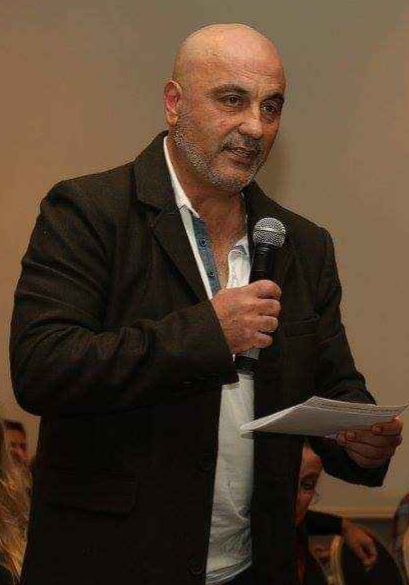
Firstly, there are around 1,000 rough sleepers in the wider Perth region. And about 40 percent of them are First Nations people.
Gerry, what are your concerns about these people being left out on the street during the pandemic?
I’ve always got concerns for rough sleepers at any point in time. My crew from the National Suicide Prevention and Trauma Recovery Project have worked with more than half of those present in the region.
And we know 30 to 40 percent of them have acute respiratory illnesses. They have co-existing illnesses, most of which are not addressed. So, they get by on medication.
But, there are mobility issues in terms of their ability to get the scripts for their medications. And people get ill and then die on the streets.
We’ve got to take the pandemic seriously, because that’s what has been put to us. There have been all these rules and powers to the point that it’s almost martial law.
And while we’ve got everybody else expected to self-isolate, we’re left with a leak in the boat, which is the homeless.
There are 1,000 people on the street in Perth, Fremantle and Peel. And formally, there are 8,000 nationally. But, informally, there are closer to 15,000 who are street present homeless across Australia.
All of these people should be accommodated now because of the public health risk.
The media is emphasising that people over 70 or those with comorbidity issues are most vulnerable to the COVID virus. And we’ve got an escalated risk because of these people on the streets.
If the contagion is as serious as they are arguing, the state must ensure that the homeless of Perth – and all of Australia – are accommodated. This is firstly for their own humanity, as well as for the public health safety risk.
Otherwise, how are we supposed to believe this virus exists if we are not housing the homeless.
As a solution, the WA government is trialling the housing of 20 rough sleepers in a hotel for a 30 day period. What do you think about this initiative?
It’s bloody reprehensible. I’ve worked with the homeless the majority of my life. I have housed a lot of homeless people. And if there was a political will to house them, they wouldn’t be homeless.
There is the example of Helsinki in Finland, where they’ve reduced street present homelessness, so that it’s become negligible.
Forty percent of Finland’s homeless numbers have been reduced due to their Housing First agenda. So, if there is a political will, it can be done.
If we’re supposed to take COVID-19 as seriously as it is being prosecuted globally – and at the Commonwealth and state level here – then why are we doing a 30 day trial for 20 homeless people?
Thirty days is a long time in the scheme of a pandemic. I’m a mathematician and I understand this better than the average person.
They’re arguing all these curves, so then why would we be taking 30 days? Why aren’t we turning this all over in 24 hours?
In New Zealand, the government actually allocated 1,000 hotel and motel rooms for a thousand homeless people in 15 towns. And they turned that over in 48 hours.
In Adelaide, 230 homeless people have been accommodated in motels and hotels.
So, why is Western Australia doing a 20 person 30 day trial, when it has 1,000 street homeless?
Your organisation the National Suicide Prevention and Trauma Recovery Project has taken it upon itself to help some of those left out on the street during the COVID-19 crisis. What has that involved?
We have finite resources, and we’ve blown the budget completely. But, we’ve done the humane thing and tried to house as many as we can, as it is our thing to work with the marginalised, the homeless and the vulnerable.
We have also accommodated many homeless families prior to COVID-19, so we know that where there’s a will, there’s a way.
For me, what I would like to see is accommodation for the homeless post COVID-19.
But, to answer your question, we have accommodated 43 rough sleepers. And we are continuing to support them even though we’ve blown the budget.
We are relying on GoFundMe donations and other support. We’ve done more than double the prescribed option from government.
And let me tell you about one other person, Jesse Noakes works at the coalface with the most vulnerable.
A lot of homeless people come his way through the Daydawn Advocacy Centre, which is a Perth-based charity. He’s single-handedly accommodated 35 homeless people at the Hougoumont Hotel in Fremantle.
So, you’ve got one individual who has accommodated 35. You’ve got our small national service that has accommodated 43.
And then we’ve teamed up to support the Wungening Aboriginal Corporation to house another 45 street present homeless at Woodland Point.
As NITV reported last week, WA police are simply moving on these homeless people. And officers are threatening them with arrest if they don’t comply.
What is the sense in doing that? Where are they being moved on to at a time when the wider community is in lockdown?
That’s the sad part. The police are moving them on because they’ve been told to minimise the risk of the spread of COVID-19.
So, they’re moving them from outside the shopping malls. They are moving them out of the parks. And they’re moving them out of the city centres.
What they’re really asking the rough sleepers to do is disappear. Vanish. It’s beyond reprehensible. It’s an abomination.
As police were moving them on, one person asked, “Where am I supposed to go?” And the officer basically said, “Wherever. Somewhere else.”
Some of the homeless are actually crashing at places where they fled in the beginning. They might have fled domestic violence situations or other detrimental living circumstances, and now they’re being asked to go back.
And lastly, Gerry, what would be an adequate response from the Western Australian government to these people being left out on the street during the pandemic?
In the end, it’s not hard to find 1,000 hotel rooms. In Perth, Fremantle and Peel at the moment there are 90 percent vacancy rates.
We are not being charged anything over $100 a night. Some places charge $60 or $40 a night. But, even the best hotels are not charging more than $100.
The government can easily subsidise hotel rooms indefinitely during this crisis for a thousand rough sleepers.


